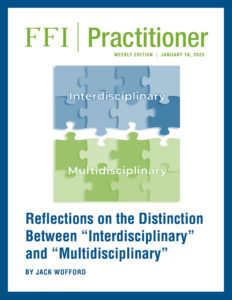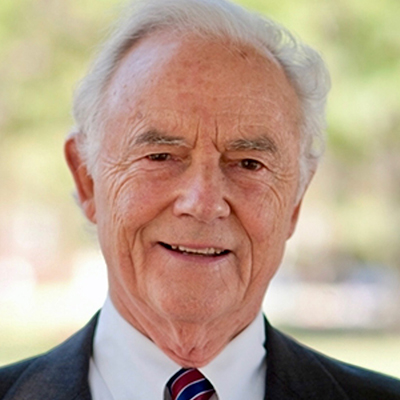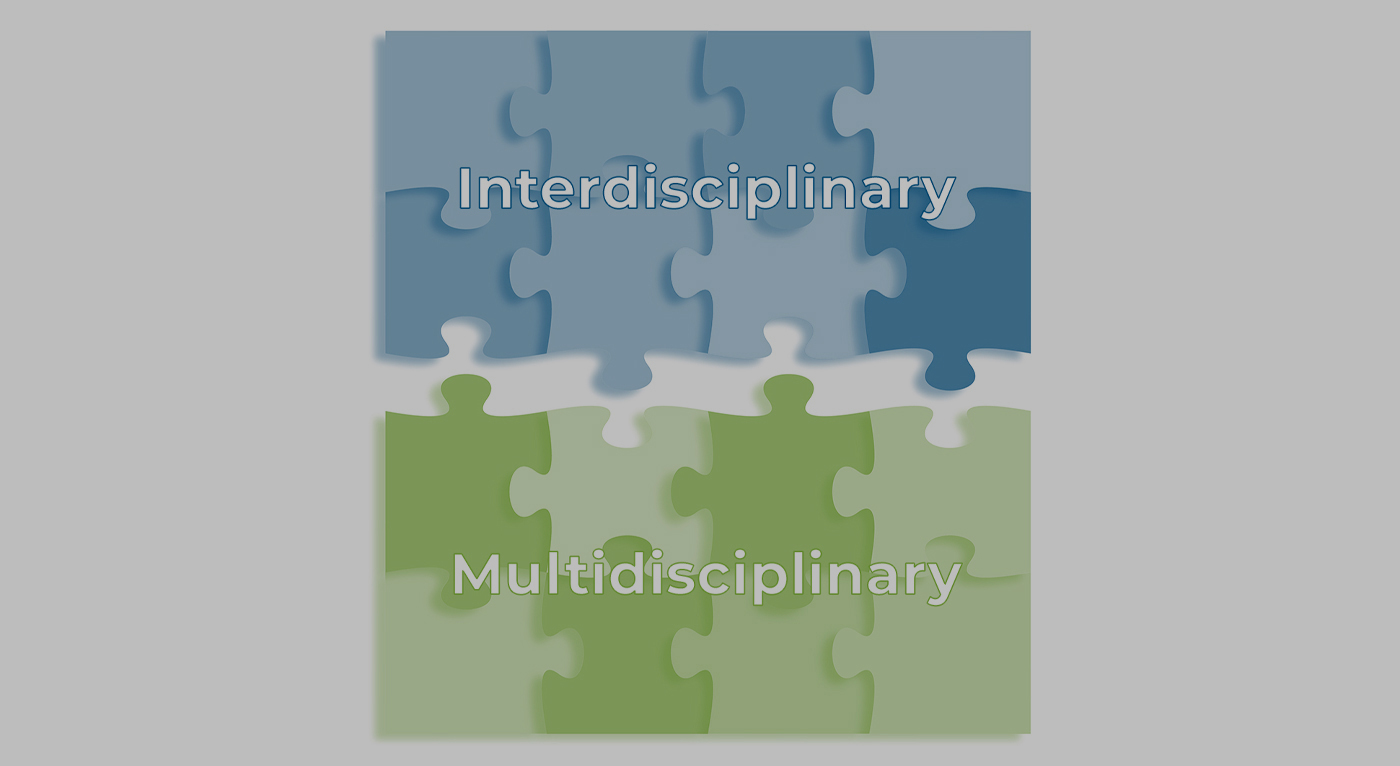
View this edition in our enhanced digital edition format with supporting visual insight and information.
In this issue of FFI Practitioner, we are pleased to feature reflections of Jack Wofford, the recipient of the 2022 FFI Interdisciplinary Award. Jack provides a brief history of his experience in FFI and explores challenging questions facing the field. Questions like: What is the difference between multi-disciplinary and interdisciplinary? How is understanding the distinction critical as one approaches client engagements? Are we — FFI, universities, consulting firms — doing enough for the field and for multi-generational clients in providing both theoretical and practical learning and insights?
At the 2022 FFI Annual Conference in Cambridge, Massachusetts, I was honored to receive the organization’s “Interdisciplinary Award.”
Receiving this award inspired me to reflect on my journey working with family enterprises as well as the meaning of two words frequently used in the field: “interdisciplinary” and “multidisciplinary.” They’re not the same, and I want to comment on the different challenges of each.
“Multidisciplinary” has been an overarching watchword for the 28 years I’ve been part of FFI—soaking up insights from each of the professions of origin—finance, law, management, and therapy—and using them in my work as an impartial mediator, arbitrator, facilitator, and consultant helping families deal with conflicts in their enterprises.
FFI was a savior for me in 1994 when I was thrust into mediating my first family enterprise conflict—nine family owners of a giant business who had assembled to deal with business issues for the first time ever, after their second-generation CEO had died with no succession plan. “Stay out of my way,” he had told siblings and cousins, aunts, and uncles, “and I’ll make you a lot of money.” They did, and he carried through…until his sudden death. Two of us—a finance expert and I—were summoned to mediate, mainly (we thought) over who should be the next CEO.
I had just come from successfully facilitating 42 stakeholders charged with creating an improved design for the new bridge across the Charles River, part of the “Big Dig.” The result of their work is something you’ve probably seen—Boston’s iconic Zakim Bunker Hill Bridge. This was a hot and very complicated political and transportation challenge.
By comparison, I thought this family business dispute would be easy—that we were helping them pick the next CEO. But after two days of confidential interviews with those nine owners, I felt thrust into a morass of swirling currents and cross-currents—or to use another metaphor, lost in a dense forest with creatures jumping out from behind each tree. One owner wanted cash, another wanted to be the new CEO, an uncle was in a hospital with a stroke brought on by a threat to sell the business, a whole line was living with the aftermath of the female branch of the family getting stock with no control but with increasing value, two eager young MBAs wanted to be recognized, a very bright woman had resigned as general counsel because she didn’t want to deal with conflict in the company, a widow in her eighties kept reminding everyone that “she wasn’t dead yet.” And, of course, they had no effective governance structure. I could go on. You get the picture.
On the flight back from those initial meetings, I said to my colleague that he and I knew techniques of mediation, but we didn’t know anything about family business. We did research to find out where we could learn—quickly—some of the basics in this area. We found FFI, with its office in Brookline, Massachusetts, across the river from my home office in Cambridge.
I telephoned the FFI office. They were very cooperative. “Glad to send you our reading list. Hope you’ll join,” they said. “When do you close?” I asked. “Five o’clock,” they answered. I went to the office, and Judy Green and staff pulled articles from the Family Business Review and other sources, beginning, of course, with the “Three Circle Model of the Family Business System,” written in 1978 by Renato Tagiuri and John Davis. They gave me articles about boards of directors, approaches to liquidity, gender bias, employment in the business, etc. I felt rescued, gaining some structure and order to deal with the chaos of conflicting emotions and interests, in what I realized were multidisciplinary challenges.
FFI has been my intellectual home ever since, helping me develop an understanding of family enterprise conflicts, realizing that each one is different, with no cookie-cutter approach, no formulas, but with financial, legal, management, and emotional challenges—truly “multidisciplinary.” But “multidisciplinary” is not the same as “interdisciplinary,” the name of this award.
This important distinction raises the question – how do we, as advisors, accomplish that teamwork?
- One way is to team up with someone with different training and expertise. In this regard, I’ve had extraordinary interdisciplinary experiences collaborating with Jane Hilbert-Davis, with her background in therapy and management consulting, and Kathy Wiseman, with her MBA and focus on family systems, and I’ve learned enormously from them.
- Another way to be interdisciplinary is to create a consulting organization with its own array of experts in different professions—organizations like Cambridge Family Enterprise Group, CFAR, and Lansberg Gersick Advisors, just to name three large, New England-based firms. Such organizations provide built-in opportunities for interdisciplinary work.
- A third way is to provide a network of experts to whom an individual can turn. For example, we can belong to FFI study groups to broaden our insights and widen our networks. Or we can be available by phone or email to FFI colleagues with needed expertise.
This approach to “interdisciplinary”—the availability of other experts as resources—is what I’d like to focus on, with three questions for consideration:
- Is FFI becoming more of an organization of family enterprise consultants than of individual practitioners in our four professions of origin? When we designed the structured educational programs—initially called Launching Pad and Essentials (the predecessors of the GEN program)—they were intended for people in the different professions, not to become family enterprise consultants but to help individual practitioners know when they needed help from other disciplines and how to find it. Are we still doing enough to help those practitioners in their respective fields?
- Are there ways FFI can convey to individual practitioners all over the globe that resources outside their particular field are available? There are thousands of tax and estate lawyers, financial advisors, accountants, management consultants, and psychotherapists who have never heard of FFI. How do we help them find the organization and its intellectual concepts and experience? Are we effectively using the internet and social media to show them there are experts they can call on for advice? Beyond the Iberoamérica Virtual Study Group articles, should we translate FFI Practitioner into Spanish or other languages?
- Are we predominantly serving clients who are families of wealth—after all, they can pay the bills for truly expensive interdisciplinary work? What about all the other families facing the same types of problems—but without the resources to retain expensive experts beyond their existing most trusted advisors in accounting and law?
These are some of the questions on my mind as I celebrate the enormous help FFI has been to me over many years. As Gertrude Stein lay dying, she asked her partner Alice B. Toklas, “What is the answer?” and, upon hearing no answer, Gertrude is supposed to have asked, “In that case, what is the question?” I give you these three questions to consider, understanding there are no easy answers.
I would like to conclude by once again thanking FFI for this award—with its challenging name!
About the Contributor

Jack Wofford, FFI Fellow, is the 2022 recipient of the FFI Interdisciplinary Award. Jack is a mediator, facilitator, lawyer, and arbitrator with his own national and international practice based in Cambridge, Massachusetts. He has practiced consensus building for over 40 years, beginning with major public policy conflicts, and continuing as partner in the real estate department of a Boston law firm, resulting in construction of complex development projects. From 1999 to 2002, he was a Presidential appointee to the Federal Service Impasses Panel, resolving disputes in negotiations between the federal government and its unionized employees. Jack is a former member of the FFI board of directors. He graduated from Harvard College, Harvard Law School, and Oxford University, where he was a Rhodes Scholar. Jack can be reached at johnwofford@earthlink.net.

View this edition in our enhanced digital edition format with supporting visual insight and information.



